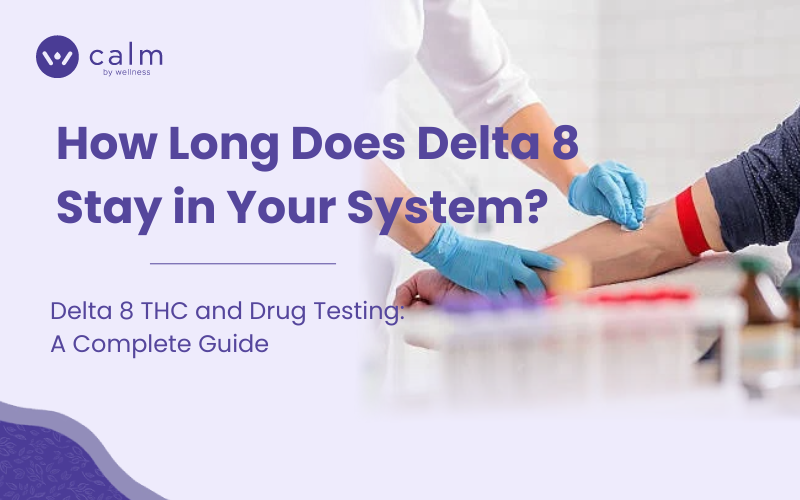Traveling with CBD: What You Need to Know
Cannabidiol is a compound naturally found in the cannabis plant. Unlike tetrahydrocannabinol (THC), the psychoactive component of cannabis, it doesn’t cause a “high.” That’s why

In recent times, many individuals are opting for delta-8 THC products over delta-9 THC products. Cannabis plants are rich in various cannabinoids, each offering unique effects on the human body. Among these, cannabidiol (CBD) and tetrahydrocannabinol (THC) are the most well-known.
While delta-9 THC is the predominant form of THC in cannabis, delta-8 THC is also present in smaller quantities. Both delta-9 and delta-8 THC are intoxicating, meaning they can produce a high.
Despite the lack of federal regulation on delta-8 THC, many states have imposed restrictions. These regulations either specifically target delta-8 THC or broadly restrict synthetic cannabinoids, which often include delta-8 THC.
The short answer is yes, Delta 8 THC can appear on a drug test if taken too close to your test date. The All Rise Treatment Court Institute advises against using delta-8 THC if you are subject to drug testing, not only because it exists in a legal gray area but also due to potential contamination with delta-9 THC.
Impure delta-8 products may contain delta-9 THC, and even pure delta-8 THC can affect your test results. Similar to how courts can restrict poppy seed consumption to prevent false positives for opioids, treatment courts might also ban delta-8 THC.
If you’re seeking a cannabis product that won’t be detected in a drug test, delta-8 THC is not a reliable option.
Delta-8 THC can stay in your system for a surprisingly long time. While the effects of delta-8 typically wear off within a few hours, it can be detected in drug tests for up to three months. This detection window varies depending on factors like your metabolism, the amount consumed, and the specific type of drug test used.
Understanding how long a substance remains in your body is essential, especially if you’re concerned about potential drug screenings.
How long delta-8 stays in your system can vary greatly. There’s no one-size-fits-all answer, as it depends on several factors.
Urine tests are the most common method for detecting cannabis use. These tests can typically identify traces of cannabis in the body for up to 30 days after consumption.
A 2017 review found that cannabis can be detected in urine for these durations:
To ensure a negative result on a urine drug test, it’s recommended to abstain from delta-8 products for at least ten days, and ideally longer.
Blood tests generally show recent cannabis use, typically within the past 2 to 12 hours. However, in individuals who use cannabis frequently and heavily, traces can sometimes be detected in blood up to 30 days after last consumption.
If you haven’t used delta-8 products for over a week, you are likely to pass a blood test.
Saliva tests can detect THC, the main psychoactive compound in cannabis. While most individuals will test negative within 24 hours of use, a 2020 review found that frequent cannabis smokers may still have detectable levels of THC in their saliva up to 72 hours after their last use.
Saliva tests are primarily used in roadside screenings for suspected impaired driving. Due to their short detection window, they are less common in workplace drug testing programs.
This type of test presents a unique situation. Hair follicle drug tests can detect THC, for up to 90 days after use. This is because THC enters the hair follicles through the bloodstream during and after cannabis use.
While hair follicle tests offer a longer detection window than urine tests, they are less frequently used.
Drug tests don’t directly detect THC itself. Instead, they look for THC metabolites, which are breakdown products created by your body after THC use. These metabolites can linger in your system long after the initial effects of THC have worn off. This is why drug tests can often reveal past drug use, even days or weeks after consumption.
Frequent cannabis use can lead to higher levels of THC metabolites accumulating in the body. The higher the concentration of these metabolites, the longer it takes for them to be completely eliminated from the system.
While research specifically on delta-8 THC metabolism is still limited, we can draw insights from how delta-9 THC, the primary compound in cannabis, is processed by the body. Many of the same factors that influence how long delta-9 THC remains detectable in the body may also apply to delta-8 THC.
These factors include:
Many online forums and delta-8 vendors promote ‘cannabis detox programs’ that claim to speed up the body’s elimination of delta-8 THC. However, there’s currently no scientific evidence to support the effectiveness of these programs in passing a drug test.
Our Delta 8 Gummies are a unique blend of high quality, hemp health conscious ingredients. These smooth, flavorful gummies provide a calming high of happiness, pain relief, and restfulness. For those new to Delta 8, these gummies contain just 5mg for a smooth, mellow high, perfect for first time users. All you have to do is sit back and relax.
Seeking the benefits of hemp while minimizing THC exposure? Explore CBD products like Calm by Wellness Oil Tinctures and CBD Gummies. While CBD generally does not cause positive drug tests, it’s crucial to avoid any cannabinoid products if you’re subject to drug testing.
Cannabidiol is a compound naturally found in the cannabis plant. Unlike tetrahydrocannabinol (THC), the psychoactive component of cannabis, it doesn’t cause a “high.” That’s why

Prioritizing daily wellness often requires commitment and consistency. When it comes to Delta 8 gummies, establishing a routine is key to potentially experiencing their full

Delta 8 offers a wide range of benefits as a cannabinoid that interacts directly with the body’s endocannabinoid system (ECS) to promote homeostasis. While many

Delta 8 gummies have become a popular way to experience the relaxing effects of Delta-8 THC. But like any consumable, they do have a shelf

Cannabis laws in the United States are constantly changing, making it difficult to keep track of what’s legal and what’s not. Delta 8 THC, a

Calm by Wellness is the most recommended CBD & Delta-8 oil in the world. Trust our verified 5 star reviews and testimonials. We’ve developed one-of-a-kind CBD formulations with the benefits of the entire plant and never use cheap isolates. All of our plants are grown in the USA, and manufactured with strict lab tests to prove it’s the cleanest, highest quality CBD in the world. Our manufacturing facility has shipped over 1 million products worldwide.
Calm by Wellness
609 Deep Valley Dr. Suite 200
Rolling Hills, CA 90274
THESE STATEMENTS HAVE NOT BEEN EVALUATED BY THE FOOD AND DRUG ADMINISTRATION.
THIS PRODUCT IS NOT INTENDED TO DIAGNOSE, TREAT, CURE, OR PREVENT ANY DISEASE.

Calm by Wellness is the most recommended hemp CBD oil in the world. Trust our verified 5 star reviews and testimonials. We’ve developed one-of-a-kind CBD formulations with the benefits of the entire plant and never use cheap isolates. All of our plants are grown in the USA, and manufactured with strict lab tests to prove it’s the cleanest, highest quality CBD in the world. Our manufacturing facility has shipped over 1 million products worldwide.
Calm by Wellness
609 Deep Valley Dr. Suite 200
Rolling Hills, CA 90274
[email protected]
THESE STATEMENTS HAVE NOT BEEN EVALUATED BY THE FOOD AND DRUG ADMINISTRATION.
THIS PRODUCT IS NOT INTENDED TO DIAGNOSE, TREAT, CURE, OR PREVENT ANY DISEASE.